Dragon Games: Unraveling Power and Ambition in Westeros
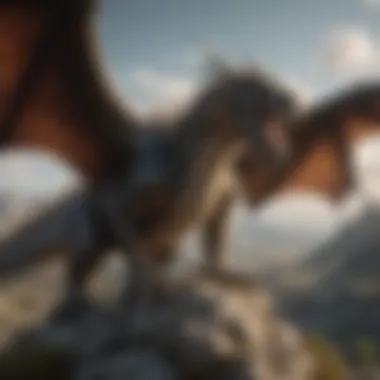
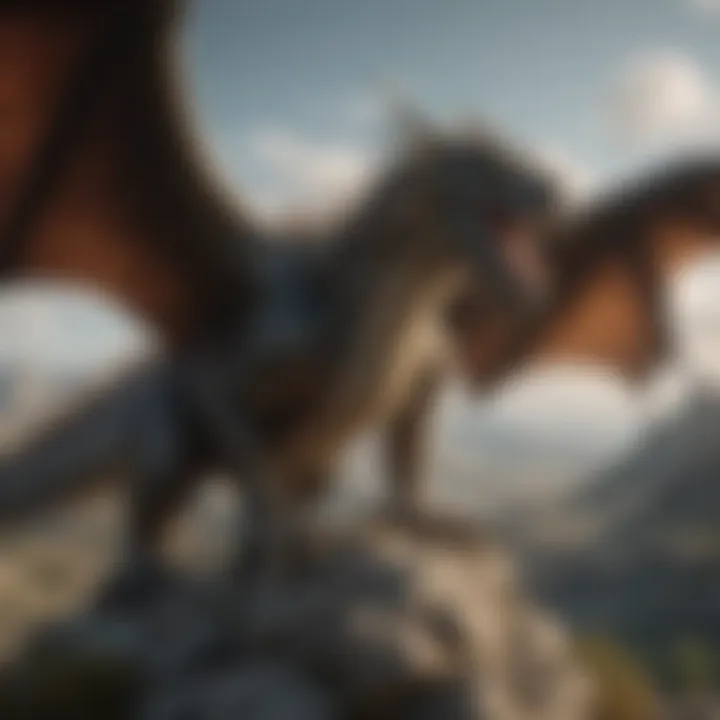
Intro
The intricate narrative of Game of Thrones is woven with the threads of power, ambition, and the omnipresent shadows of hope and despair. Central to this tapestry are dragons, representing strength and authority, embroiled in the politics of Westeros. This exploration elucidates how the concept of dragon games emerges through strategic maneuvers and symbolic significances, illuminating the underlying motivations and tensions throughout the series.
Understanding the dynamic role that dragons play requires examining the character arcs, plot developments, and mythos that define the Game of Thrones framework. As we plunge into this analysis, we will not only discuss the critical characters who are shaped by dragons but also reflect on the episodes that highlight their influences and the deeper lore that enriches our knowledge of Westeros.
Character Dissections
In this section, we delve into key figures whose destinies intertwine with dragons. Characters are not merely vessels of narrative progression; they embody the ambitions and aspirations reflected in the very nature of dragons. Each character displays a distinct relationship with these mythical creatures, portraying multifaceted interpretations of power.
Detailed analysis of key characters in Game of Thrones
- Daenerys Targaryen: The evolution of Daenerys from an exiled princess to the Dragon Queen illustrates the dual nature of power. Her connection with the dragons, particularly Drogon, signifies her rightful claim to the Iron Throne and her aspirations to unify Westeros. Her decisions often reflect an intense, sometimes reckless, manipulation of her dragon's power, forging fear among allies and enemies alike.
- Viserion and Rhaegal: These dragons serve two distinct purposes. They not only bolster Daenerys's strength but also symbolize parts of her personality. They portray her dual refrain of benevolence and vengeance. The loss of Viserion evokes deep sorrow and marks a pivotal shift in the strategic landscape of the North and beyond.
- Jon Snow: Jon's tie to dragons transcends mere kinship. His is a destiny steeped in honor, loyalty, and sacrifice. In Season 7, when he rides Rhaegal, it underscores the union of his Stark upbringing and Targaryen heritage. This moment represents more than mere alliance; it hints at shared aspirations to protect Westeros from looming threats.
Character development throughout the series
Throughout the series, characters evolve as the ever-present specter of dragons shifts allegiances and motivates actions. Daenerys's initial naive ambition transforms into hardened advocacy for her vision of freedom, while characters like Cersei Lannister also recalibrate their understandings of power due to the looming dragon threat. The intertwining fate of dragons and reshaping personal arcs introduces layers into the storytelling.
Impact on the overarching storyline
Dragons redefine the stakes. Their emergence often initiates significant conflicts and resolutions, creating ripples that affect the course of Westeros’s history. As Daenerys uses dragons to conquer cities, players across the realm respond with their strategies, leading to a complex game of chess played on the stage of war, inseparable from the existence of her dragons.
Prolusion to Dragon Games
In the narrative of Game of Thrones, dragon games represent much more than mere myth or entertainment. They encapsulate deep strategic maneuvers, political implications, and cultural symbols that resonate throughout Westeros. Understanding the role of dragons in this context can provide insights into the psyche of characters and their motivations, revealing the intricate layers of story crafting.
Dragons serve as potent instruments of power, heavily influencing the decisions of those who wield them. The presence of dragons changes the course of conflicts and balances of power. This influence is not only felt on battlefields but also in halls of governance where alliances and rivalries are sculpted.
By analyzing the dragon games within Game of Thrones, one gains valuable perception of the character dynamics. Key figures such as Daenerys Targaryen employ dragons as tools of statecraft, making the interpretation of their intentions and desires deeper. Understanding these intricacies helps fans view the story from multifaceted perspectives.
Furthermore, exploring how the symbol of the dragon intertwines with concepts of fear, loyalty, and ambition reveals much about human nature. Characters react to dragons not just physically, but on emotional and psychological levels as well.
The examination of dragon games enriches the dialogue around morality, power struggles, and the consequences of ambition within the series. It allows the audience to appreciate both the sheer spectacle of dragons in flames, and their symbolic complexity within the overarching theme of power dynamics across the narrative.
To summarize, the topic of dragon games is vital to grasping the thematic depth and intelligence ingrained within the Game of Thrones saga. It challenges viewers to think critically about how dragons, sailors of fantasy, are interwoven into the very fabric of power struggles of Westeros.
The Symbolism of Dragons in Game of Thrones
In the complex narratives of "Game of Thrones," the dragons are more than mere creatures. They serve as profound symbols representing power, fear, and the exercise of political will. Each dragon is infused with layers of meaning, enriching the overall storyline. Their presence alters the balance of power, fuels ambition, and amplifies fear across Westeros. As a audience, understanding the symbolism that dragons embody is crucial to grasping the motivations of the characters and the dynamics of the political relationships in the realm.
Dragons as Agents of Power
Dragons, particularly those under Daenerys Targaryen, symbolize unrestricted power and the manifestation of divine right. The very act of controlling these majestic creatures showcases unparalleled authority. Daenerys harnesses the dragons as tools, projecting her strength to allies and enemies alike. Their ability to incinerate opponents may not merely equate to brute force but presents a broader commentary on sovereignty.
In this context, dragons elevate the status of their riders. The Game of Thrones world tells us that Targaryens regard their connection with dragons as divinely validated. This relationship is a declaration of destiny, positioning the Targaryens as rightful heirs to the Iron Throne. The fact that Daenerys can command dragons distinguishes her from others vying for power.
- Dragons can influence allegiance.
- They bring fear that breeds loyalty.
Consequently, the dragons become crucial pieces in the intricate game of thrones. Opponents recognize their might and react with trepidation. Often, the presence of dragons can dispel competition without a single battle being fought, demonstrating their psychological dimension.
Dragons and the Concept of Fear
The psychological impact of dragons extends prominently into the realm of fear. They metamorphose from myth to makeshift avatars inspiring dread. This fear is different from tactics on the battlefield. It embodies a long-reaching influence on political maneuvering and societal structures. Those who face unleveled opposition often decide against crossing paths with someone wielding dragon power.
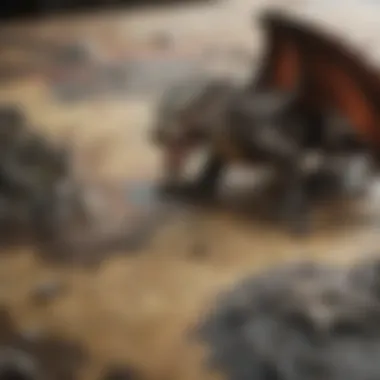
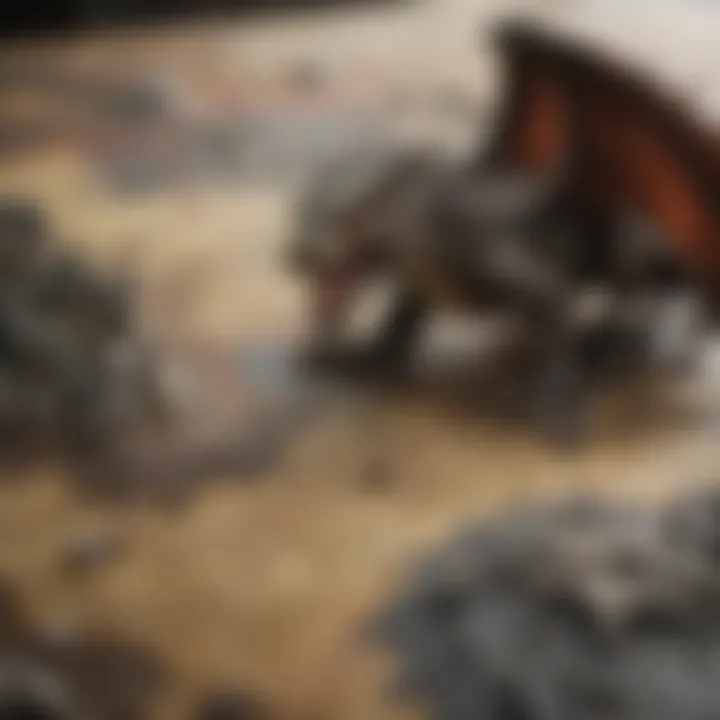
Daenerys’s dragons serve as potent reminders of the volatility in power dynamics. When she absentmindedly regards them as mere tools, she overlooks their ability to impact outcomes. Combining strategic fear along with fiery destruction creates a duality in how characters perceive power and its consequences.
"Dragons command attention not just for their might but for what they represent in the strategy of ruling. Fear becomes a political instrument."
By utilizing fear associated with dragons, Daenerys not only captures the imaginations of her followers but forces her detractors to reconsider their ambitions. This stranglehold mirrors the intersection of politics and emotional psychology in the adaptation of strategies.
Ultimately, understanding the symbolism of dragons expands beyond their presence in battles. It captures the emotional and psychological grounds that govern power struggles in "Game of Thrones."
Origins of Dragons in Westeros
Understanding the origins of dragons in Westeros is pivotal for grasping their significance throughout the Game of Thrones series. Dragons add layers of depth to the narrative, as they represent not just formidable beasts but also serve as symbols of lineage, power, and ambition. The history of dragons in this universe sheds light on the tumultuous dynamics between families and factions, shaping the overall landscape.
Historical Context of Dragons
The historical background of dragons in Game of Thrones is essential for connecting major events. Initially, dragons were thought to have extinct several centuries before the start of the novel series. However, the Targaryen lineage brought them back to life, effectively altering the political power landscape of Westeros. These creatures do not merely exist in isolation; they are tied to the ancestral connection of their house and the events throughout history.
Dragons were first introduced to Westeros through Aegon the Conqueror, who utilized his dragons to establish dominance over other nations. This initial use defined their role not only as a physical weapon of war but also as an emblem of authority. The use of dragons set a precedent, as many noble houses realized their potential for securing not just land but also prestige.
In their historical context, dragons became synonymous with fear and reverence. The Targaryens managed a unique link with these mighty creatures, marked by a genetic ability to perceive and connect with them. This bond revealed deeper themes of destiny and intended purpose, becoming a central tenet in the Targaryen's expansionist philosophy, their divine right to rule, and their often tumultuous reigns.
The historical resonance continues throughout the series, reflecting moments where power, treachery, and awakening dragons play critical roles introducing conflict and thriving story arcs.
Dragons in Targaryen Legacy
Dragons hold a commanding place in the legacy of House Targaryen. Their rule emerged as a fabric woven tightly with the fire-breathing beasts themselves. The Targaryens, known as the last dragonlords, derived immense power from their relationship with dragons. This kinship solidified their rule over the Seven Kingdoms following the conquest of Westeros.
Through the centuries, the Targaryens integrated dragons into their culture. Important events were accentuated on the back of these creatures, and legends formed around their imagery and role in their lineage. As a result, dragons became a symbol of the Targaryen claim to the Iron Throne, with grandeur and tragedy woven intimately together.
Furthermore, dragons influenced various aspects of social hierarchy and prestige. The dragons represented not just raw power but also tradition, folklore, and destiny. They became emblematic of the Targaryen identity. Each dragon took on attributes specific to the House, weathering away tribal divisions among the bloodline rather than intensifying them. For instance, names like Balerion, Vhagarian, and Drogon honor the legacies, while also reflecting personalities purported by their Targaryen riders.
Overall, dragons are more then mere tools of conquest; they symbolize the rise, reign, and demise of their legacy. This rich history and mythologizing established the dynamism that fans examine closely, altering the narrative's progression and conflict throughout the series.
Dragons and Warfare Tactics
The inclusion of dragons in warfare completely revolutionizes strategies and conversions of power within the Game of Thrones universe. Their sheer presence signifies not only military might but also leaves an indelible mark on the psychological fabric of rival factions. At their core, dragons serve as pivotal assets in conflicts, altering engagements' dynamic on the battlefield.
For Daenerys Targaryen, the dragons are not mere beasts of war; they incarnate her claim to the Iron Throne. Their utilization, therefore, comes laden with historical context and illustrative symbols. Intellectually, one can connect military endurance and lofty ambition to the roles that dragons play among powerful houses.
Dragons intertwine their symbolism with the pursuit of dominance. To harness dragon warfare represents both an achievement and a curse, seen throughout the centuries of Targaryen rule.
Strategic Uses of Dragons in Battle
Strategically employing dragons in warfare allows for tactical depth hard for mere soldiers to match. When dragons deploy aerial bombardments, they instill an unparalleled level of panic, causing rival forces to falter.
Some crucial strategic elements include:
- Tactical Supremacy: Engaging from the air provides unique attack angles.
- Terrifying Presence: Opponents can subsequently lose their courage when seeing dragons in positioning.
- Destruction Capabilities: Fire transforms static fortifications to easily destroyed ash.
From the burning of Harrenhal to the siege of Meereen, dragons ensure any conflict significantly favors their owners. Assessing placements, any wise commander recognizes the compelling advantage inherent with their engagement.
Psychological Warfare: The Threat of Dragons
The construct of fear is essential in warfare, and aspects of dragons accentuate this condition to extremes. Foes understand the implications of a dragon's flaming breath can erase whole battalions. Through fear, leaders can broker surrender rather than prompt expensive confrontations. This psychological tactic fuels negotiation, memory, and narrative surrounding warfare.
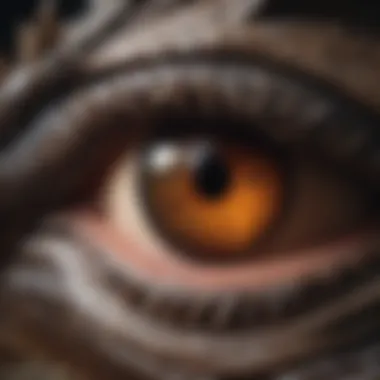

Combatants under the shadow of dragons report declines in morale. What dragons represent has deep psychological implications:
- Intimidation: The mere thought of dragons changes battle formations.
- Legendary Status: Myths build fear. This results in strategic avoidance, sometimes thwarting battles before they begin.
- Unity through Fear: A group might come together against a common threat exemplified by the power dragons posses.
Character Interactions with Dragons
Understanding the interactions between characters and dragons in the Game of Thrones universe is vital to appreciate the deeper layers of the narrative. These moments do not merely transcend mere spectacle; they underscore complex character arcs, unveiling themes of power, responsibility, and identity. Throughout the series, dragons symbolize not only the raw forces of nature but also personal connections that drive the characters' motivations and outcome of their quests.
Interactions with dragons reveal how characters align themselves with power and exemplify their motivations in the political chess game of Westeros. For example, the relationship that exists is often revealed through the lens of control and domination, leading to larger questions about destiny and freedom.
Daenerys Targaryen: The Dragonmother
Daenerys Targaryen's bond with her dragons is foundational to her character. Initially, these creatures represent her claim to the Targaryen legacy. They are not simply pets; they are her weapons and audience, embodying her aspirations as a ruler. From the moment she hatches the dragon eggs, she embraces her identity as 'Mother of Dragons.' This title encapsulates both maternal affection and the ferocity associated with dragons.
Throughout the series, Daenerys shows a unique talent for connecting with her dragons. Her ability to communicate and ride them amplifies her power as a leader.
The Role of Dragons in Plot Development
Dragons are not mere beasts in the Game of Thrones universe; they are core elements that influence the course of events, driving both character arcs and the overall narrative. Their presence commands attention and amplifies the stakes of a always-unpredictable world. The dynamic relationship between dragons and key players in the story illuminates underlying themes of ambition, power, and fear. Thus, understanding the role of dragons in plot development is essential to appreciate the depth of the narrative.
Key Moments Highlighting Dragon Influence
Several monumental moments in the series strongly link plot progression to the ominous image of dragons. A few noteworthy instances reveal how the dragon narrative intertwines with character journeys and storyline transformation:
- Daenerys's Gealilitary Texasant Gains: Her acquisition of dragon eggs catalyzes her evolution from an exiled noble into a formidable contender for the Iron Throne. The dragons, once hatched, represent both personal and political growth.
- Battle of Hardhome: The phenomenal arrival of Euron Greyjoy stoked new suspicion and clash amongst factions. From the undead army to dragons executing scorching attacks, this battle serves to showcase the pivotal role dragons have in motivating decisions.
- Destruction of King’s Landing: One of the most deeply impactful sequences in the series, the razing of the city leads to significant repercussions for characters. The devastation visibly alters alliances and prompts varying interpretations of morality and war due to dragons’ inherent destructive abilities.
In these key events, dragons do more than substantiate conflicts; they infuse emotional weight into pivotal choices that mark heroes and villains.
Dragons as Catalysts for Conflict
Dragons also serve as catalysts for shaping conflict in Westeros. Their raw power bleeds into the political maneuvers between the Great Houses, altering balance and inciting unrest. Their undeniable might brings a double-edged sword to battles and alliances. Consider the way dragons compel characters to re-strategize their ambitions:
- Creation of the Targaryen Legacy: Their immense power acts as both a lure and a deterrent for other noble families. Houses either conspire to control the dragons or distance themselves to avoid playing into Targaryen hands.
- Tension Between Daenerys and Cersei: The confrontation between these two women reveals the larger stakes at play. Cersei's ambition is complicated by the threat a dragon poses, escalatiing the need for schemes in the court.
- Potential Alliances: The shifting requirements for alliances often pivot on dragon strength. Noble houses gear toward coalition not simply for harmony, but also for the necessity of obtaining, trapping, or obliterating dragons.
Ultimately, these multisided conflicts exemplify how dragons transition power dynamics. In pursuit of mastery over them, characters reveal intrinsic motivations and moral dilemmas, often sacrificing what's vital to them in the face of overwhelming force.
As we study these dragons, we find surrounding dangers, aspirations, and personal ambitions plaited together. No other creature in the Game of Thrones represents these elements as powerfully and intricately as dragons do.
Fan Theories on Dragons
As we delve into the universe of Game of Thrones, the realm of dragons remains a topic bubbling with speculation and fan engagement. The theories regarding dragons offer insight into the narrative depth of George R.R. Martin’s creation. Uncovering these ideas not only enriches our understanding of dragons but also enhances the overall enjoyment and intricacies of the storyline.
Fans theorize various elements relating to dragons, especially their origins and unique powers. One relevant area of focus is how such speculations impact the larger narrative and character development. Fans actively participate in discussions on Reddit and other forums, showcasing their passion. This kind of engagement increases interest levels around plot twists, hints, and references embedded within the story.
The broader context of these theories includes examining their significance in the imperialistic aspirations of certain characters who aspire to wield dragons in their quest for dominance. For many, these discussions and analyses transform spectators into active participants in the lore of Game of Thrones, increasing its interactivity.
Thus, so-called dragon theories serve as fascinating touchpoints for fans and serve multiple purposes: they spark conversation, connect various plot threads, and deepen one's appreciation of the franchise. This participatory dynamic ensures that the topic of dragons extends well beyond mere fantasy into cultural discourse.
Speculations on Dragon Powers
The powers attributed to dragons in Game of Thrones provoke a wide array of speculation from fans. Central to many of these theories are the various dragons that are recognized in the series, namely, Drogon, Rhaegal, and Viserion. Fans discuss the unique attributes of these dragons, questioning their significance in battles and narrative arcs.
Key points of speculation include:
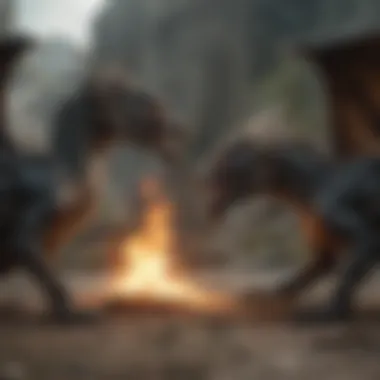
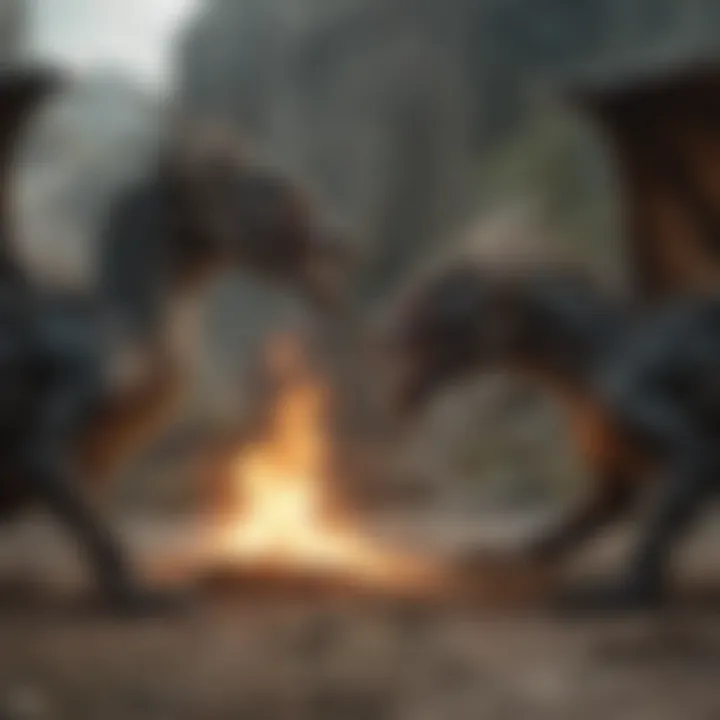
- The extent of fire-breathing capabilities. Some argue that fire may shape the bond between the rider and the dragon even further.
- The potential ancestral connection linking dragons to elements of magical realism, carving out new paths for character interactions.
- The ways dragons may integrate with subplots involving White Walkers and the balance they bring to power dynamics, transformed from fearsome beasts into Kyrptonite-like packaging.
Moreover, fan theories may purposefully reflect underlying themes of power dynamics and morality within the series. Will dragons emerge as liberators or oppressors in forthcoming narratives? These musings guide appealing discourse among dedicated fans.
Future of Dragons in Upcoming Narratives
The fate of dragons beyond the television series remains a matter of intrigue. Fans regularly share hypotheses regarding groundbreaking developments likely to unfold. With upcoming projects in the Game of Thrones universe, such as House of the Dragon and potential adaptations of lesser-known tales, the implications for dragon lore are profound.
Discussions concerning the future also delve into how dragons will reclaim their status or further weave into political struggles. How can these mythical creatures be displayed in possible world-building contexts and reflections on Westerosi history? Moreover, collaboration between dragons and character story arcs may give rise to fresh generational conflicts.
Here are a few prominent considerations regarding the future role of dragons:
- The resurgence of lost Targaryens and their bond to dragons. Some fans see potential new dragons emerging from ancient bloodlines.
- A deeper exploration of dragon training, feeding, and understanding—a side of the bond yet to be fully disclosed.
- The influence of external threats such as the remaining White Walkers or other ancient foes unimaginable in traditional suits of armor.
Viewing future narratives with dragon significance invites entirely different realms for speculation. Fans continue to engage in creatively encouraging debates while weaving necessary threads of intrigue that complement the narratives to come.
Dragon theories enrich Game of Thrones, weaving internal and external threads within its complex fabric. These explorations empower fans to discuss expectations meaningfully and monitoring narrative trajectories already in play.
The Intersection of Dragons and Political Ambition
The intertwining of dragons and political ambition in the Game of Thrones universe presents a compelling dynamic that reflects the complex social and power structures of Westeros. This connection illustrates how dragons are not merely creatures but symbolize authority, influence, and legacy. As the realm struggles for dominance, the sight and sound of dragons serve as a potent reminder of Targaryen might and the lengths individuals will go to achieve their aspirations.
Dragons represent more than fire-breathing beasts; they are tools of authority that distinguish power and legitimacy. Their presence signals a claim to the throne. Their usage in battle reshapes armies, shifting the balance of power significantly. This reinforcement of status is evident in the actions of characters like Daenerys Targaryen, where her connection to her dragons propels her journey toward rulership. Therefore, analyzing how dragons act as a catalyst for political ambition uncovers deeper themes of legitimacy among competing houses.
Dragons as Symbols of Divine Right
In the Game of Thrones, dragons denote divine right to rule, derived from their association with House Targaryen. The Targaryens’ unique lineage differentiates them among the nobility, creating an unmatched claim to the Iron Throne. As the last surviving dragonlords, Daenerys and her ancestors harness the dragons as a conduit of their sovereign authority.
Dragons symbolize both strength and divine favor. Characters believing in their own rights often overlay a sense of destiny. For instance, Daenerys often sees her dragons as part of a sacred mission to reclaim the throne taken from her family. This affects not only how characters view her but also influences alliances forged in terror and respect.
The irrefutable bond between a dragon and its rider becomes a point of divine endorsement. The symbolism postures each rider as not merely a leader but a chosen figure fated to rise.
You can see this dynamic not only in the header of kingdoms but also across conflicts. Daenerys unleashes her dragons as statements of power against rivals. Simultaneously, this challenges the status quo. Nobles regard their actions as unjust, marking the relationship between supposed authority and actual power.
Power Plays: Dragons and House Alliances
The political landscape in Game of Thrones denotes alliances crafted under the watchful eye of dragons. Houses frequently enter transactions, ranging from marriage proposals to striking deals predicated on mutual benefit and security. In these calculations, the proximity to dragons has a transformative effect. Associates of Daenerys ceratinly insecurities about other factions. This is increased more so when they behold the sheer might that dragon-riding offers on the battlefield.
The plight of Tyrion Lannister exemplifies his acute understanding of dragons’ role in politics. As he advises Daenerys, he underscores the importance not only of controlling dragons but also leveraging their presence as leverage in alliances. Potential allies weigh the costs versus the benefits involved in associating with a powerful ruler shrouded by the fire and grandeur of dragons.
Several polarizing instances emerge. One moment may hinge on agreements made for protection through dragons in war; another may highlight ambition crumbles under the pressure of backing dragons from unfit sides. Such tensions in allegiances exemplify the unpredictability that dragons bring into strategic planning within political negotiation and landscape.
In this way, the association of political ambition and dragons reshapes games of power and authority in the realm of Game of Thrones, inviting critical evaluation of the characters' ambitions and actions directed toward the Iron Throne.
Finale: The Enduring Legacy of Dragons
The dragons of the Game of Thrones universe represent far more than just mythical creatures; they embody deep cultural and political significances that resonate throughout the storyline. Their presence illustrates not only the personal ambitions of characters but also the broader socio-political landscape of Westeros. The analysis of dragons from various perspectives leads us to a deep understanding of their role in the narrative.
The key element of the enduring legacy of dragons lies in their symbolization of power and control. Throughout the saga, dragons signify the overarching theme of dominance that governs the relationships between Houses. Daenerys Targaryen’s journey emphasizes how the possession of dragons can shift the ebb and flow of power. The imagery of flying dragons castles invasively alarms rivals,(objectively strengthening Daenerys's position in Westeros.) Their fiery breath stands as a testament to raw power capable of reshaping nations.
Moreover, dragons serve as catalysts for conflict. Their ability to instill fear and initiate battles showcases the psychological warfare at play. Rivals are often left with the choice between submission and daring any confrontation with a dragon. This duality of fear and reverence adds a complex layer to strategic discussions involving House alliances.
- Dragons’ Political Significance: Dragons have opened discussions on monarchy legitimacy and divine right to rule.
- Inspiration for Conflict: Entire allegiances and battle plans hinged on a dragon’s potential to incinerate entire armies.
In terms of character interaction, the emotional bond formed between Daenerys and her dragons helps narrate personal growth and trauma. This multilayered relationship reflects the responsibility of wielding such immense power, cultivating an atmosphere where each character’s caution or ambition is severely tested.
As a literary device, dragons introduce moral complexities. They force a consideration of ethical implications involving violence, warfare, and power. The dragons, thus, are not mere instruments of destruction but serve as a commentary on human nature’s thrill of ascension, dominance, and the cost associated with such pursuits.
In Game of Thrones, the finality of dragons' contributions rests heavily on interpretation. Their impact reaches beyond mere physical representation; they are woven into the narrative as symbols, a reflection of the characters’ goals and the chaotic world in which they exist. The khollowing shadow of debts to the Targaryen line and the fervent discussions surrounding future narratives suggest that their legacy will likely be voiced in continuing lore, whether in potential sequels or related media.
Ultimately, the legacy of dragons continues to shape fan theories and discussions among Game of Thrones aficionados. Their roles could evolve in future developments, retaining the aura of mystery that once set fire to the imagination of viewers.



